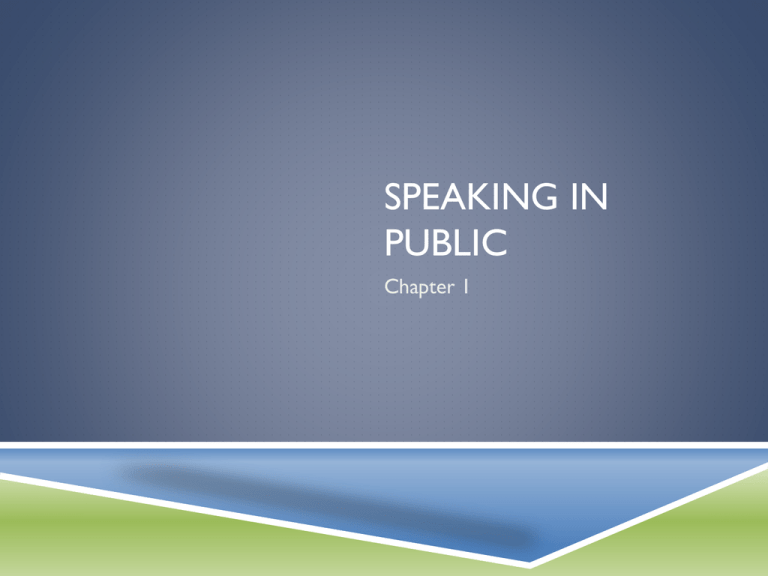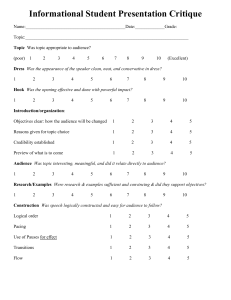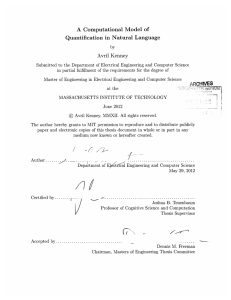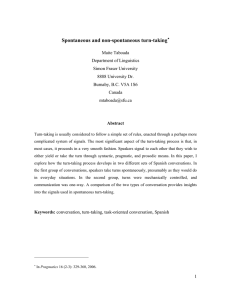Speaking in Public - Dr. MaryAnn Seward
advertisement

SPEAKING IN PUBLIC Chapter 1 • The art of public speaking is useful in getting a job, employers tend to look for someone who can speak and consider among one the highest job qualification. • Being able to speak clearly and efficiently enables you to get your point across while gaining the respect and recognition from others. • “One who forms a judgment on any point but cannot explain might as well never have thought at all on the subject” –Pericles • People are more likely take what you have to say seriously if you’re a good public speaker. • Public speaking is also important in everyday life. It can empower you to accomplish great achievements and make a difference. HOW PUBLIC SPEAKING AND HAVING A CONVERSATION ARE SIMILAR… 1. Organize your thoughts logically You wouldn’t tell a story or give directions out of order instead you deliver it systematically. 3. Telling story for maximum impact When telling a joke or an incident that occurred; you wouldn’t start out with the punch line. You would build up the suspense. 2. Tailor your message to your audience Instead of telling a young person something the say way you would tell a rocket scientist you think of a simpler way to tell them. 4. Adapting to listener feedback You pay attention to the person your having a conversation with facial expressions and reactions. Public Speaking is more highly structured. • Requires more detailed planning • The speaker must accomplish his or her purpose in the time allotted for the speech Public Speaking requires more formal language • Slang and such has no place in a speech • Listeners respect people who clean up and polish the language in their speech Public speaking requires a different method of delivery • You must adjust your voice and posture to avoid distraction from your main purpose • Using verbal pauses such as “um” or “uh” or “er” is looked down upon OVERCOMING STAGE FRIGHT First what you should know: • You’re not alone • Even famous actors and talk show host admit to getting nervous before public speaking! • “Now after many years of practice I am, I suppose, really a ‘practiced speaker.’ But I rarely rise to my feet without a throat constricted with terror and a furiously thumping heart. When, for some reason, I am cool and self-assured, the speech is always a failure.” –I. A. R. Wylie • In 2001 the Gallup Poll asked Americans what their greatest fears were and 41% said that speaking in front of a group of people was number one. • It’s perfectly normal ☺ SECONDLY: HOW TO DEAL Acquire Speaking experience • The more you public speak the more comfortable you will become. Also the more you understand how to develop and deliver a speak the less nervous you will be. Prepare • Pick speech topics that you care about and that you feel passionately about. Being prepared can reduce stage fright by 75%. Think Positively • When a negative thought pops into your mind reverse it and turn it into something positive. IT HELPS HOW TO DEAL…CONTINUED Use the power of Visualization • Visualize yourself doing a good job on your speech. Know that most nervousness isn’t visible • Most of what you feel inside can’t be seen or noticed by others. Don’t expect perfection TIPS: • Be your best physically and mentally; get some sleep. • Before speaking tighten and relax your leg muscles • Take deep breaths • Work extra hard on your introduction (research says your anxiety level drops significantly within the first minute) • Make eye contact • Concentrate on communicating with your audience • Use visual aids WHAT’S HAPPENING WHILE YOUR SPEAKING IN CLASS AND EVERYDAY… Speaker- The person who is presenting an oral message Message- Whatever the speaker communicates to someone else Channel- the means by which a message is communicated Listener- the person who receives the speaker’s message Feedback- the messages, usually nonverbal, sent from a listener to a speaker Frame of reference- the sum of a person’s knowledge, experience, goals, values, and attitudes. No two people can have exactly the same frame of reference Interference- anything that temporarily pauses the speech or interrupts Situation- the time and place of the speech SPEECHES IN DIFFERENT CULTURES Make sure to take into consideration the cultural diversity that may be present in your audience. Don’t use racial slurs or slang as you might offend a member of your audience making your speech a failure. Also try to appear open minded and accepting. Understand other people values and beliefs or customs. Remember not to judge a speaker on their ethnicity or race.







